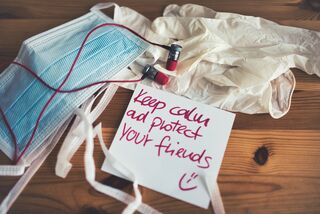OCD
Is COVID-19 Causing an "Epidemic" of OCD?
Coping with anxiety due to the pandemic
Posted October 15, 2020 Reviewed by Matt Huston

Have you ever experienced any of the following?
- Being fearful of touching objects for fear of contracting a deadly illness.
- Being afraid to go outside or be with others for fear of contracting a deadly illness.
- Feeling a sudden rush of irrational anxiety when someone near you coughs, sniffles or sneezes.
- Having an urgent impulse to wash your hands when you touch a doorknob, railing, or surface that has been touched by others.
- Having an urge to wear gloves when touching surfaces to limit contact with your skin.
- Needing to sanitize and decontaminate surfaces even if you have a suspicion they are not likely to cause you harm.
- Feeling preoccupied with intrusive worries and fears for your health and safety every time you have an abnormal sensation in your body or even for no apparent reason at all.
- Finding yourself thinking things like “What if I’m sick and I don’t know it?” “What if I walk around and pass this illness on to someone else?”
- Following rigid routines such as removing clothes in a set pattern or way when getting undressed after work or after being outside your home.
- Finding it difficult to make peace with the limitations of your efforts to protect yourself—that you can’t be 100% certain or 100% guarantee your safety.
Before March 2020 if a person had described the above experiences it would have seemed that their anxiety was getting the best of them, to say the least, and very likely that they suffered from Obsessive-Compulsive Disorder (OCD). Most of us who don’t suffer from OCD would say that the above thoughts and behaviors are much more than what is generally called for in everyday life, or at least before COVID-19 became a universal cause for concern.
Unfortunately, the COVID crisis has made these and other anxious thoughts and behaviors a common and everyday experience for many of us worldwide. Does this mean that now we all have OCD?

The answer is that generally, no, most of us do not newly have OCD if we did not suffer from OCD prior to the pandemic. Rather, the more general cause for concern and alarm has increased across the board for almost all of us. Many of us may now have more compassion for people who suffer from OCD because we have a newfound awareness of what it’s like to have these worries be top of mind, to have to change our everyday behaviors in ways we would have never expected to reduce the spread of disease, and to stay alert for new information and/or reasons for concern.
As defined in the Diagnostic and Statistical Manual of Mental Disorders (DSM-5), OCD involves recurrent obsessive thinking and/or compulsive actions (called rituals) that are severe enough to be time-consuming and to cause significant distress or interference with daily life. One of the most frequent manifestations of OCD is a form called "contamination OCD" (formerly called hypochondriasis) which can be described as the fear of a threat such as dirt, germs, toxic chemicals, becoming ill, or spreading contamination to others. In addition to intense fears and intrusive thoughts, people with this form of OCD typically have compulsive behaviors that are responses to the anxiety or level of threat and serve the function of reducing the level of distress or mitigating the threat.
The COVID pandemic has caused many of us to reconsider how vulnerable we are as we move about the world and to worry about whether we can cope with what this international public health crisis may bring to our communities. While there are some people, likely a small minority, who will have new-onset OCD or health anxiety, many of us are experiencing what we would call a relatively universal reaction to something that we view as a threat to all of us in our society. As the impact of the COVID-19 pandemic presses on, we see an overall increase of stress and anxiety in the general public at large. The pandemic has impacted everyone differently, and sometimes in surprising ways. It may have caused increased anxiety in some people who wouldn’t have expected it and not done so in some people who would have thought they'd be more impacted.

What should I do to address this anxiety if I have it? It depends on the situation. For example, if we were treating a person with contamination OCD, the treatment would typically involve finding ways to fight the impulses caused by the OCD so as to cause the OCD to lose its power. In a typical case of OCD, the OCD sufferer’s assessment of the level of threat or danger is exaggerated and based more on emotional reasoning than the facts at hand, and often people who suffer from OCD may struggle to reconcile their feelings versus what they know to be logically true. Treatment of OCD includes interventions focused on facing your fears, proving that there really is no threat or the threat is exaggerated, undoing the systems and rules that are in place because of the OCD, and not doing whatever the OCD tells you to do.
Unlike in the case of contamination OCD, our current reality is that the threat is very real, not imagined. At the same time, the threat is not necessarily omnipresent in all situations and environments, and our scientific understanding of the virus has improved dramatically over the past months.
Here Are Some Tips for Dealing With Anxiety Caused by the COVID Crisis:
- If you have found yourself frequently wondering what to do or if you are doing the right things to address this very real concern, you are not alone. This is where public health authorities can help us. Look up the current guidelines for what to do to mitigate the spread of the virus. Check from time to time for updates—but not too frequently—so that over time you can know how the situation is evolving.
- Limit the amount of time you spend watching or reading the news if you notice your stress levels rising as a result. Set aside specific times to allow yourself to stay updated, but if outside of this you feel compelled to check or watch more than you think is healthy or helpful, find additional pleasant or productive activities to fill some of that time. If watching too much news on TV is a concern, you can try a passive activity like playing music or finding distracting and lighter entertaining programs to download or watch. Never have direct streaming services been more helpful than a time like this, since they provide endless variety.
- If you’re unsure if what you’re doing to protect yourself is right, or whether it may be "too much," one thing you can use is a sort of survey technique. You can check with a few friends, family, and neighbors to see how they are handling the decision you are facing and compare your actions with theirs to see where they fall along the spectrum of anxious behavior. Identify someone you generally view as reasonable and ask them how they are handling this situation and what they have been implementing and compare notes.
- Still unsure if you are managing the stress of COVID-related health anxiety? Consider joining a support group or individual therapy. Across the country, there are treatment options that you can access from home via telehealth and most insurances have allowed telehealth due to social distancing policies in place.
- Knowledge is power: Educate yourself about anxiety, health anxiety, and coping skills—there are great online resources that can help with this. Give yourself enhanced language to describe what you are experiencing.
- If you have or suspect you have OCD, now is a great time to get help, and it can be done from the comfort of your home. Don’t let the COVID pandemic become an opportunity for your OCD to take advantage of you. Educate yourself on ways to curb your compulsive habits if they start to get the better of you due to the stress of COVID. Be safe and practice routine precautions including social distancing, hand washing, and wearing face masks when in public or in groups. Be mindful that the major public health organizations are not necessarily writing their guidelines with sensitivity to people who suffer from OCD or health anxiety, so you may have to make a little extra effort to figure out the more common-sense implementation of what is recommended.
To find a mental health professional near you, visit Psychology Today's therapy directory.
LinkedIn Image: Dragana Gordic/Shutterstock. Facebook image: fizkes/Shutterstock


